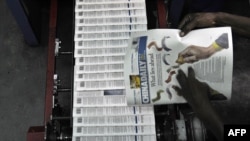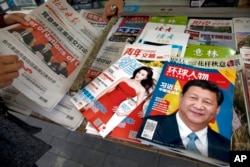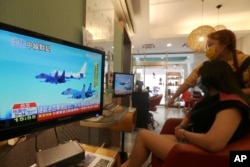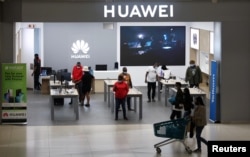When Dapo Olorunyomi, publisher of the Nigerian newspaper the Premium Times, was in school in the 1970s, he remembers receiving in the mail "glossy Chinese magazines that were sent freely, celebrating and glamorizing China's great progress."
China's media influence strategy in Nigeria has grown more aggressive since then, Olorunyomi said.
Nigeria is the most vulnerable country to Beijing's global media influence, a Freedom House report released Thursday found. Freedom House is a Washington-based non-governmental organization focused on human rights and democracy.
Globally, China's campaign to influence global media is intensifying, with efforts increasing between 2019 and 2021 in 18 out of 30 democracies analyzed by Freedom House.
The report looked at not only Beijing's efforts to influence media in democracies but also the response from those countries, which were then rated on resilience.
And while the intensity of China's efforts was marked "high" or "very high" in 16 countries, the report — Beijing's Global Media Influence: Authoritarian Expansion and the Power of Democratic Resilience — found plenty of pushback.
The Chinese Communist Party (CCP) uses a range of tactics, Freedom House found, including the mass distribution of state-produced content, harassment and intimidation of local outlets, targeted disinformation, and the use of cyberbullying and fake social media accounts.
It's main goal, Freedom House says, is to influence public opinion in its favor, sometimes as a way to ensure its investments in the target countries.
"The Chinese government is using more sophisticated, more covert and more coercive tactics, like cyberbullying, or cyberattacks, or just phone calls to journalists, to try to pressure and influence coverage in countries around the world," said Sarah Cook, Freedom House's research director for China, Hong Kong and Taiwan, and one of the report's authors.
China's Embassy in Washington referred VOA to a recent comment made by China's Foreign Ministry. Foreign Ministry spokesperson Mao Ning dismissed Freedom House's report as false and "driven by ulterior motives."
"Telling the story of the Communist Party of China [CPC] and presenting a true, multi-dimensional and panoramic view of China to the world is part and parcel of the job of Chinese media and foreign service," Mao Ning said. "We will continue to tell the world the story of China."
Freedom House found pushback from a combination of "policymakers, news outlets, civic groups, or social media users."
The response varies from country to country, said Angeli Datt, a China analyst for Freedom House and one of the report's authors.
"In some countries it was as simple as publishing critical news coverage and in others, like Taiwan, it was civil society organizing mass demonstrations of thousands of people against CCP infiltration into the news environment," Datt wrote in an email to VOA. "The depth of regional and linguistic variety shows that resilience to CCP influence has truly gone global."
Despite that resilience, the extent of China's attempts to sway public opinion through more favorable coverage is something that countries need to be proactive in combating, she said.
Researchers point to Chile as an example of that resilience.
Beijing's campaign in Chile began as a strategy to improve its public image in an economically important country, according to Sascha Hannig. The researcher at Chile's pro-democracy foundation Instituto Desafíos de la Democracia contributed to the Freedom House report.
Over time, "it became more controversial and aggressive," Hannig said, with a campaign that appeared to be trying to challenge Chilean democracy and promote the Chinese model.
Although most Chileans in 2019 and 2020 held a positive view of China, according to Freedom House, skepticism and criticism of China's aggressive diplomacy is growing among politicians and journalists. Public opinion of China has been on the decline since the coronavirus pandemic, Hannig said.
A stronger commitment to democracy and press freedom in Chile also helps mitigate the potential threats.
'Polluted information'
In Nigeria, which Freedom House says is most vulnerable to influence efforts, China has made significant economic investments, including in infrastructure.
But recent authoritarian shifts and declining press freedom in the West African country make Nigeria more susceptible to Beijing's efforts, the report found.
Part of that influence comes through content-sharing agreements between Chinese-run media operations and local media, which help Chinese content reach large numbers of Nigerians.
StarTimes, a Chinese company that says it partners with more than 200 African media outlets, plays a big role in Nigeria's digital television infrastructure, Freedom House says. StarTimes provides cheap subscriptions that "favor Chinese state media over other international broadcasters," the report said.
The Nigerian Embassy in Washington did not reply to VOA's request for comment.
In many cases globally, a media outlet will flag that content as provided by China, but analysts say audiences may not be aware that the content, often presented as news, lacks editorial independence.
VOA offers content to affiliate stations globally but the Congress-funded broadcaster has a firewall and other measures ensuring editorial independence and integrity.
"Paid-for content often doesn't undergo editorial scrutiny, and falsehoods or misleading information is published by local outlets which people trust," Freedom House's Datt told VOA.
This proliferation of content-sharing agreements is concerning to Idayat Hassan, the director of the pro-democracy research group the Centre for Democracy and Development, in Nigeria's capital, Abuja.
"Nigerians end up consuming mostly polluted information in an era of information disorder," Hassan said, because it can be easier for Nigerian outlets to just repost articles from Chinese outlets like Xinhua.
Huawei — a Chinese technology company that the report says has "close CCP ties" and a "record of building censorship and surveillance systems" in China and elsewhere — also occupies a prominent space in Nigeria's digital infrastructure, according to the report.
"That's where the danger really lies," Abuja-based Olorunyomi told VOA, referring to Chinese influence over Nigeria's digital infrastructure.
To Cook, media infrastructure is at risk of becoming the new frontier of China's efforts.
With few exceptions, like WeChat and a Chinese-owned news aggregator app in Nigeria called Opera News, Beijing has not paid much attention to influencing content dissemination infrastructure. Instead, it has predominantly focused on manipulating content itself, the report found.
When it comes to bigger components of digital infrastructure provided by Chinese-owned companies, "the level of manipulation is really unclear and doesn't seem to be strong at the moment, but the potential is very much there," Cook said.
Countries have not been proactive in addressing that vulnerability, Cook said.
For more than 15 years, democracy has been on the decline around the world, Datt said. Without strong action to shore up democratic institutions, the CCP can take advantage of those flaws.
Nigeria, for instance, is slowly adopting CCP-style internet controls, which end up exposing the country to more Chinese influence, she said.
For Cook, the lack of measures to prevent influence over media infrastructure is another hole that Beijing could exploit.
"Infrastructure — that's the future," she said. "Now's the time to put in the safeguards."







